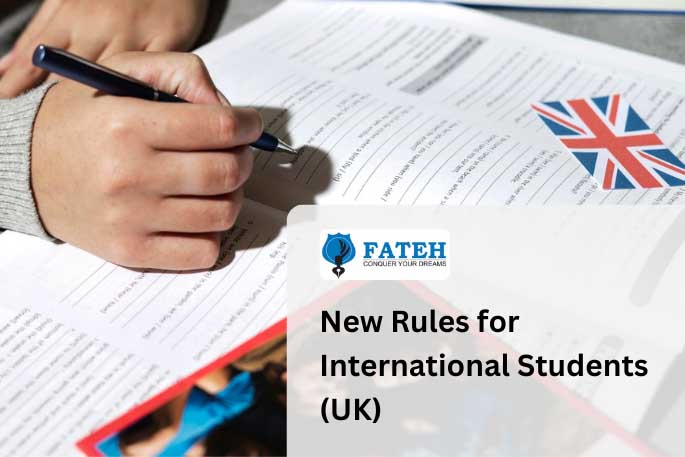Introduction
Offering top-notch education and varied cultural experiences, the UK has always been a popular place for overseas students. Several fresh policies and amendments adopted as of 2024 impact overseas students, especially with relation to the Post-Study Work (PSW) [Graduate Immigration Route (GIR)] Scheme. Prospective and present students need to be aware of these changes if they are to make wise decisions regarding their education and employment. This guide offers thorough information on the PSW [GIR] Scheme, the new student visa rules 2025 and how these developments affect overseas students.
What is the PSW [GIR] Scheme?
Key Benefits of the PSW [GIR] Scheme
- Extended Stay: As of 16th May 2025, international graduates who complete their undergraduate or master’s degrees can stay in the UK for up to 24 months under the Graduate Immigration Route (GIR). This policy remains unchanged, and the two-year post-study work opportunity is still in effect. Although a proposal from the White Paper on Immigration to reduce this duration to 18 months was released on 12th May 2025 as part of the UK’s ongoing immigration review, no changes have been implemented as of now.
- Employment Flexibility: Under this scheme, graduates can work in any role at any skill level without being tied to a specific employer. This adaptability helps recent graduates pursue alternative careers or acquire knowledge in several industries.
- Pathway to Permanent Residency: Applications for other visa categories, such as Skilled Worker visa, which might finally result in permanent residency in the UK, can be greatly supported by the work experience acquired during the PSW period.
- Enhanced Employability: Employers both here in the UK and abroad generally find graduates with UK work experience highly valuable. The PSW [GIR] Scheme therefore improves employability and professional opportunities.
Eligibility Criteria for PSW [GIR] Scheme
Graduation Requirements
- Eligible Degree Levels: Those who have graduated from a recognised UK higher education institution with a bachelor’s, master’s, or PhD are eligible for the scheme.
- Recognised Institutions: Only students from licenced sponsors with a track record of immigration regulation compliance qualify. This covers universities and other higher education establishments that satisfy specific standards established by the UK government.
Visa Conditions
The PSW [GIR] visa has specific conditions that applicants must fulfil:
- Application Process: Applications for the PSW visa mostly take place online. Candidates have to open a UK Visas and Immigration account on the GOV.UK website and confirm their identification using the ‘UK Immigration ID Check’ app. If their Student (or Tier 4) visa was issued with a Biometric Residence Card or Permit (BRC/P), they must obtain it. EU, EEA, or Swiss nationals can use their biometric passport for verification. Upon successful application, an eVisa will be issued.
- Duration and Conditions: As of 16th May 2025, international graduates from bachelor’s and master’s programmes can remain in the UK for up to 24 months under the Graduate Immigration Route (GIR), while doctoral graduates are permitted a stay of three years. This period offers graduates the freedom to work at any skill level, without the need for a job offer—making it a valuable opportunity to explore industries, gain UK work experience and shape their long-term career goals. Although a proposal to reduce the duration to 18 months was introduced on 12th May 2025, no official change has been implemented so far.
Work Permissions
The PSW [GIR] Scheme provides broad work permissions:
- Types of Employment Allowed: Graduates can take up any employment or be self-employed. They can work in any sector and at any skill level.
- Limitations and Restrictions: While the PSW visa offers extensive work permissions, it does not lead directly to permanent residency. Graduates must switch to another visa category, such as the Skilled Worker visa, to work towards permanent residency.
Application Process for PSW [GIR] Scheme
Step-by-Step Guide
- Ensure you meet all the eligibility criteria for the PSW [GIR] Scheme.
- Prepare the necessary documents, including your current passport, Biometric Residence Permit (BRP), Confirmation of Acceptance for Studies (CAS) number, and proof of graduation.
- Visit the official UK government website to complete the online application form.
- To apply for the Graduate Visa, you’ll need to pay an application fee of around £822, along with the Immigration Health Surcharge—£2,070 for a 24-month stay and £3,105 for a three-year stay. This includes access to the UK’s world-class National Health Service (NHS), ensuring you’re covered throughout your time in the country.
- If you cannot use the ‘UK Immigration: ID Check’ app, book an appointment at a UK Visas and Citizenship Application Services (UKVCAS) centre to provide biometric information (fingerprints and a photo).
- Wait for the decision on your application. Most applicants receive a decision within eight weeks. If approved, you will receive an eVisa and, if applicable, a Biometric Residence Permit (BRP) for travel purposes.
- The processing time for the PSW visa is typically around eight weeks. During this period, applicants should monitor their application status and respond promptly to any additional requests for information.
Required Documents
- Valid Passport: Ensure your passport is up-to-date and valid for the duration of the application process.
- Confirmation of Acceptance for Studies (CAS) Reference Number: This number was given to you by your educational institution when they accepted you into the course you completed under your Student visa. If you cannot locate your CAS reference number, contact your educational provider to obtain it.
- Current Visa: Proof of a valid Tier 4 or Student visa.
- Biometric Residence Permit (BRP): You have to mention it if you were issued one when you got your Student Visa or Tier 4 (General).
Additional Documents You May Need
Depending on your specific situation, you may also be required to submit:
- Proof of Relationship: Should your children or partner be applying with you, you will have to provide proof of your relationship.
- Approval Letter from Scholarship or Sponsorship Provider: If a scholarship or sponsorship covers your living expenses and school fees for the past 12 months, you will require a letter from the provider endorsing your candidature.
Please note that: If your documents are not English, you might have to produce a certified translation of them..
Changes in UK Student Visa Rules for 2025
The UK student visa rules for 2025 now include several important modifications. These changes aim to streamline the application process and better prepare international students for both academic and everyday life in the UK.
Starting January 1, 2025, international students will only be allowed to bring their partner and children if they are enrolled in a PhD, other doctorate programmes (RQF level 8), or research-based higher degrees. This policy continues from the 2024 update, reinforcing the UK’s focus on high-level academic pursuits while regulating dependent visas.
Financial Requirements
When applying for a student visa in the UK, you must demonstrate that you have sufficient funds to cover both your course fees and living expenses.
Course Fees
Living Expenses
Unless you have been living in the UK with a valid visa for at least 12 months at the time of your application, you also must demonstrate that you have enough money to sustain yourself while studying in the UK.The required amount varies depending on your study location:
- For courses in London: £1,334 per month (for up to nine months)
- For courses outside London: £1,023 per month (for up to nine months)
If you are attending a residential independent school, you must cover boarding fees as indicated in your CAS.
Please note that: You do not need to demonstrate financial requirements if you have possessed a UK visa for a minimum of 12 months before submitting your student visa application and are presently in the UK.
Acceptable Sources of Funds: Acceptable sources are personal savings, student loans, and government or recognised organisation financial sponsorship. Bank statements, sponsorship, and loan letters must be submitted as evidence.
English Language Proficiency
When you apply, it’s essential to demonstrate your English language proficiency.
Methods to Prove Your English Proficiency:
- Secure English Language Test (SELT): Achieve a passing score on a SELT from an approved testing organisation.
- UK Educational Qualifications: Present a GCSE, A level, Scottish National Qualification level 4 or 5, Scottish Higher, or Advanced Higher in English, earned through studies at a UK school you started under the age of 18.
Required English Proficiency Levels
You must show that you can read, write, speak, and understand English at a specific level on the Common European Framework of Reference for Languages (CEFR) scale:
| Study Level | Required CEFR Level |
|---|---|
| Degree level or higher | Equivalent to CEFR B2 |
| Below degree level | CEFR B1 |
For Higher Education Provider (HEP) Students:
If you are enrolled in a degree-level programme or above, your Higher Education Provider may review your English competency. They might ask for a different test, but it nevertheless continues to be equivalent to CEFR level B2.
Course Requirements
- Types of Courses Eligible for Student Visas: Courses ought to be full-time and result in a recognised qualification—a degree, diploma, or certificate. Student visas do not apply to part-time and short courses.
- Minimum Course Duration: The course has to run for at least six months. This requirement assures that students commit substantial time for learning.
- Study Load: Usually at least 15 hours every week of classroom teaching, students must register in a course with a substantial course load. This load ensures that students are actively engaging in their study and satisfy visa requirements.
Impact of New Rules on Current and Prospective Students
Current International Students
For present overseas students, the new student visa regulations 2025 have many impacts:
- Visa Extensions: Students who need to extend their visas for various reasons or for longer course duration must satisfy the new language and financial criteria.
- Compliance: To prevent problems with their visa status, current students have to keep updated about and follow the revised policies.
Prospective International Students
Future pupils intending to study in the UK should give these developments some thought:
- Planning: Meeting the new language and financial criteria calls for enough preparation. Potential students should start well in advance organising their language credentials and financial situation.
- Course Selection: Choosing courses and universities that follow the new rules is absolutely vital. Students should look at and select courses that satisfy requirements for student visas.
FAQs
As of 16th May 2025, graduates can stay in the UK for up to 24 months (or three years for doctoral graduates) under the Post-Study Work (PSW) visa. While a proposal released on 12th May 2025 suggests reducing this to 18 months, no changes have been implemented yet.
No, the application must be made from within the UK before your present visa runs out.
Make sure all of your documentation is accurate, comprehensive, and submitted on time to guarantee a strong PSW visa application. Verify the eligibility requirements closely and, should you have questions, think about consulting a consultant from Fateh Education. It's also helpful to start the application process well before your current visa expires.
If your application is denied, you can appeal the ruling or resubmit to guarantee accurate provision of all eligibility criteria and supporting evidence.
No, a job offer is not required to apply for the PSW visa.
Conclusion
Understanding the new student visa rules 2025 for abroad students and the PSW [GIR] Scheme will help you to maximise your educational and career possibilities in the UK. This guide has covered all important aspects from eligibility and application processes to the effect on current and prospective students. Keep informed and proactive to ensure a flawless entry into your study and job in the UK. The PSW [GIR] Scheme offers foreign graduates a fantastic opportunity to gain work experience and maybe open the route towards permanent residence.
Good luck on your path!


